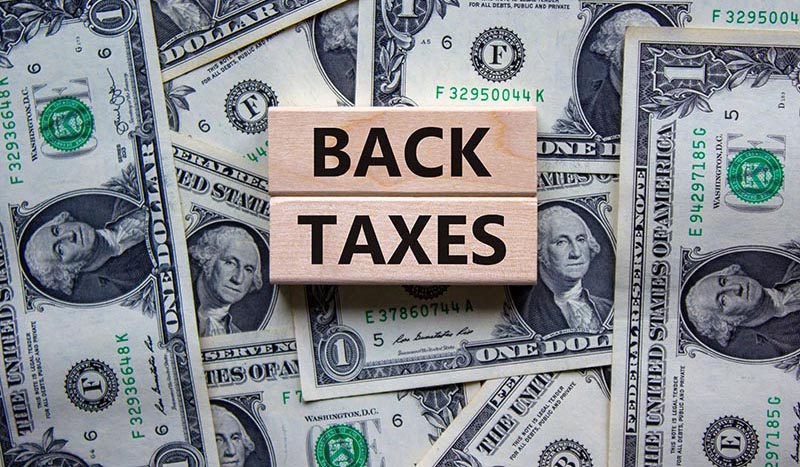How to File Back Taxes when You Don't Have Records
May 19, 2021 by Cheryl A.P. Patterson, EA, MSFS
The act of gathering, preparing, and filing your taxes can be burdensome in a normal year. So when the challenges of life strike, the last thing we are thinking about is filing our taxes. A new baby, a divorce, moving, a job change, a major health issue, natural disasters, or a death in the family are major life changes that can be all-consuming.
So, what happens when life settles down and you are ready to begin the process of preparing your back taxes – but you realize your records are lost or have been misplaced in all the chaos? Never fear. There are ways to rebuild your records.
Step 1: Rebuilding Your Records for Taxes
The first step may be to obtain your Wage and Income Transcripts for the years in question from the IRS.Gov website. If you are filing a Married Filing Joint return, there will be a Wage and Income Transcript for each of you listed under your social security numbers.
This transcript provides a wealth of information reported by employers, retirement companies, or other third-parties required to report transactions to the IRS. Examples of the types of forms reported to the IRS include:
- Wages (Form W-2)
- Retirement Distributions (1099-R) and Social Security Benefits (SSA-1099)
- Gambling Winnings (W-2G)
- State tax refunds or Unemployment Benefits (1099G)
- Interest (1099-INT)
- Dividend income (1099-DIV)
- Nonemployee Income (1099-NEC or 1099-MISC)
- Stock sales (1099B)
- Sale of a Home (1099-S)
- Student Loan Interest (1098-E)
- Mortgage Interest (1098)
There are limitations to what this transcript will reflect, however. The cost basis for any stock sold, property taxes paid, state allocation(s) or state withholding are not shown on the Wage and Income transcripts. It would be necessary to approach the issuing agency (employer, bank, broker, or Title Company) to obtain a copy of the original source document in order to get this information.
Step 2: Obtain Financial Statements
The next steps would be to obtain a copy of your bank statements, brokerage statements, and credit card statements to identify the following:
- Any other income that should be reported
- Any allowable deductions, such as church donations, medical expenses, or the cost basis for any stocks purchased
- Contributions to a ROTH Individual Retirement Account (IRA) or other non-deductible IRA that can be clearly identified
Rebuilding Business Records for Taxes
If you operate a business, it may be a little more complicated – but not impossible – to rebuild your records.
- Begin with your bank and credit card statements (hopefully you have a separate business account) to obtain clues to where you spent money. You may be able to approach a vendor to obtain a copy of receipts or invoices, or a breakdown of purchases listed on their company letterhead to back up the amount spent during the year.
- Obtain a letter from your clients to prove your income if you no longer have access to the invoices you generated to receive payments. Make sure the client letters include their contact information.
- If you are reporting car/truck expenses, you can rebuild your detailed mileage log from a calendar or bank records. You can obtain odometer readings from wherever you may have had repair work done (oil changes or tire replacement) or (if you no longer have the vehicle used) a car dealership. You will want to try to obtain at least two independent odometer readings. If you changed your own oil, this may be a challenge as you would need the receipt(s) reflecting the date you purchased the oil, and the mileage on those dates.
- This approach would also work if you need to rebuild your detailed meal or travel logs. You may be able to recreate these logs from a calendar or revisiting your bank and credit card statement that reflects a date and an amount that may trigger a memory for which client you met with and the business purpose. You can pull travel expenses from your bank/credit card statements to build your detailed log. Another option would be to go through your emails and text messages to obtain information regarding travel, such as itineraries and emails from clients that reflect the business purpose of the trip.
Rebuilding your records is possible with a little work. Moving forward, you may want to consider keeping your records electronically available on a separate hard drive from your computer or uploading them to a “cloud” site, such as Google Docs, OneDrive, or Dropbox. This may give you some peace of mind knowing that when you are ready to prepare your return(s), the records are easily accessible. There are also many apps available for your phone that will automatically track mileage, or store business receipts.
If you received a notice from the Internal Revenue Service (IRS) or a state agency and you need further help, you may want to consider reaching out to our team of experts who are ready to assist you with your unique situation. Please visit our website for further information.





